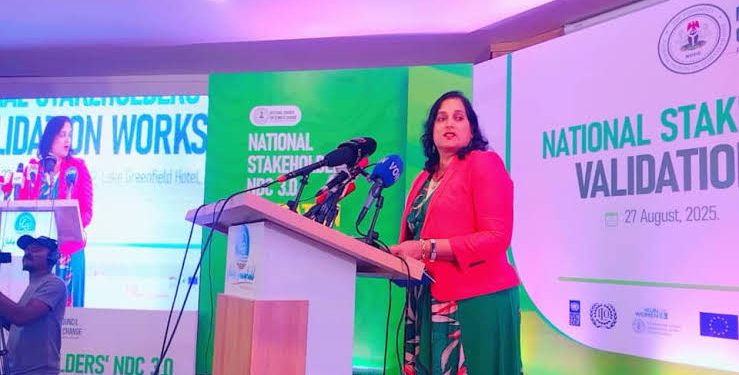The National Council on Climate Change (NCCC) has urged both domestic and international partners to scale up climate finance in order to close the funding gap required for Nigeria’s Nationally Determined Contribution (NDC) 3.0.
Speaking at a validation workshop in Abuja with the theme “Driving ambition, strengthening action and aligning with Paris Agreement and global stocktake,” the Director-General of the council said increased financing is critical if Nigeria is to meet its emission reduction targets and adapt effectively to the impacts of climate change.
She outlined a mix of financing pathways that could be deployed, including the Green Climate Fund (GCF), the Adaptation Fund, bilateral and multilateral facilities, public–private partnerships, and innovative mechanisms such as green bonds and blended finance. According to her, access to these funds would provide the much-needed resources to accelerate low-carbon development and strengthen the country’s resilience to climate risks.
Beyond international support, she stressed the importance of mobilising domestic resources. “We recognise the urgent need to reform fiscal frameworks and incentivise private sector investment in low-carbon development. Implementation of our NDC also requires significant investment in human capital and institutional capacity. We still need enhanced technical expertise for data collection, monitoring, and reporting, alongside stronger institutional coordination mechanisms,” she said.
The call comes as Nigeria works to align its climate commitments with the Paris Agreement and global stocktake. The new NDC 3.0 represents the country’s latest roadmap for reducing emissions while addressing economic vulnerabilities tied to climate change, particularly in agriculture, energy, transport, and infrastructure.
The NCCC Director-General also appealed to developed countries to meet their long-standing obligations under the United Nations Framework Convention on Climate Change (UNFCCC) and the Paris Agreement. She emphasised that commitments to technology transfer and support for innovation in developing countries must be honoured to ensure that nations like Nigeria are not left behind in the global transition.
Stakeholders at the workshop highlighted that adequate financing, technical capacity, and international cooperation will be key to Nigeria’s ability to deliver on its commitments. Without these, they warned, the gap between ambition and implementation could widen, undermining both national development and global climate goals.










